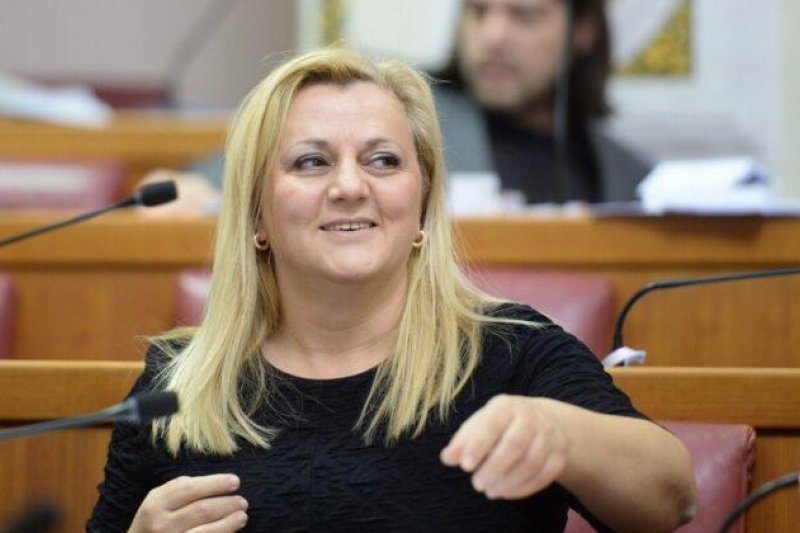Trilateral Pact Open to Other Countries
In an exclusive interview with Albanian Daily News, Albanian-Croatian Ermina Lekaj-Prljaskaj, Senior Advisor to the Foreign Minister of Croatia for the Western Balkans, Albania, Kosovo and North Macedonia, former MP, dwelt at length on joint declaration of cooperation on defence between Albania, Croatia and Kosovo signed on 18 March, 2025 in Tirana.
"The declaration represents an important step towards strengthening strategic cooperation between three countries that share common security challenges and Euro-Atlantic aspirations," said the Advisor.
Asked about the arrogant stance of Serbia toward the pact she said the trilateral agreement is not directed against any third country, but aims to strengthen cooperation and defense capabilities of allied countries, in accordance with the principles of collective security and regional stability. "It is paradoxical that Serbia, which maintains the largest military presence in the region, including its tendency in sensitive areas such as Kosovo and Bosnia, appears concerned by a transparent and cooperative initiative between Albania, Kosovo and Croatia. "
Ms. Prljaskaj stressed the declaration was open to other countries, including Bulgaria." We are not dealing with a closed alliance, but with an attempt to build a broader architecture of cooperation and security in the region. The invitation to Bulgaria reflects the aim of strengthening regional cohesion on the basis of common interests, dialogue and Euro-Atlantic values, thereby increasing stability and trust between the countries of the region."
The Croatian Advisor believed that the new EU administration will understand the strategic importance of enlargement in the Western Balkans. "Although the process depends on internal reforms in the candidate countries, there is a real possibility that the dynamics of enlargement can be accelerated. The European perspective of the region must remain alive, concrete and credible, " said the senior Advisor Prljaskaj in the following interview:
- Albania, Croatia and Kosovo signed a joint declaration of cooperation on defence on 18 March in Tirana. The document focuses on strengthening the defence and security industry and other fields of cooperation. Please, Ms. Advisor, what is the significance of this pact especially at this juncture of tense time in the Western Balkans and Europe?
- The declaration represents an important step towards strengthening strategic cooperation between three countries that share common security challenges and Euro-Atlantic aspirations. At this moment of tension in the Western Balkans and in Europe, this pact sends a clear message of unity, determination and readiness to jointly protect stability and security in the region.
- Could you tell a few words about the fact that the pact caused anger among the Serbian officials, who interpreted such a move as a threat to both the country’s territorial integrity and regional stability. How do you explain this stance?
- The reaction of Serbian officials was expected, but essentially unreasonable. The trilateral agreement is not directed against any third country, but aims to strengthen cooperation and defense capabilities of allied countries, in accordance with the principles of collective security and regional stability. It is paradoxical that Serbia, which maintains the largest military presence in the region, including its tendency in sensitive areas such as Kosovo and Bosnia, appears concerned by a transparent and cooperative initiative between countries that share common democratic values.
- It was reported that the declaration “was open to other countries”, and that Bulgaria was invited to become part of the initiative. What could you say on this?
- The opening of the declaration to other countries, including Bulgaria, testifies to the inclusive character of this initiative. We are not dealing with a closed alliance, but with an attempt to build a broader architecture of cooperation and security in the region. The invitation to Bulgaria reflects the aim of strengthening regional cohesion on the basis of common interests, dialogue and Euro-Atlantic values, thereby increasing stability and trust between the countries of the region.
- Croatian Minister of Defence, Ivan Anusic said that “the goal is to strengthen the political and defence cooperation of our countries and support Kosovo and Albania on their Euro-Atlantic path”. Please what is the significance of such a statement especially about Kosovo which aspires to join NATO?
- Minister Anusic’s statement confirms Croatia’s commitment to supporting the Euro-Atlantic integration of Kosovo and Albania. This is a strong message of solidarity and encouragement for the countries working towards NATO membership and building long-term security.
- According to Kosovo’s Minister of Defence Ejup Maqedonci, the aim of the memorandum “is not to threaten anyone but to send a message to all those who dare to jeopardize security, peace, and stability in the Western Balkans, as well as the security of our countries that our three nations, which share common values and interests, are united in facing any danger aimed at destabilizing the region”. How has NATO reacted to this move?
- Minister Makedonci’s message underlines the defensive character of the initiative and not any threatening intent. NATO sees this cooperation as a positive step – countries aspiring to membership are taking an active role in strengthening regional security and building partnerships according to Alliance standards.
- Let me ask please how about your previous active role regarding the Albanian (Arberesh) community in Croatia? Are you still engaged in their life in the Croatian society?
- Yes, my commitment to the Albanian community in Croatia is not only continuous, but dedicated with heart and mind. I stand by them in every cultural, educational and social initiative, because I deeply believe that preserving our national identity – language, tradition and history – is a cornerstone for our empowerment as a community.
At the same time, I strongly support the full integration of Albanians into Croatian society, as equal citizens and valuable contributors to it. This is not only a matter of dedication, but also a personal mission.
-How do you see the future accession of Western Balkan countries in EU after the change of the Union’s administration?
- I believe that the new EU administration will understand the strategic importance of enlargement in the Western Balkans. Although the process depends on internal reforms in the candidate countries, there is a real possibility that the dynamics of enlargement can be accelerated. The European perspective of the region must remain alive, concrete and credible. / ADN














